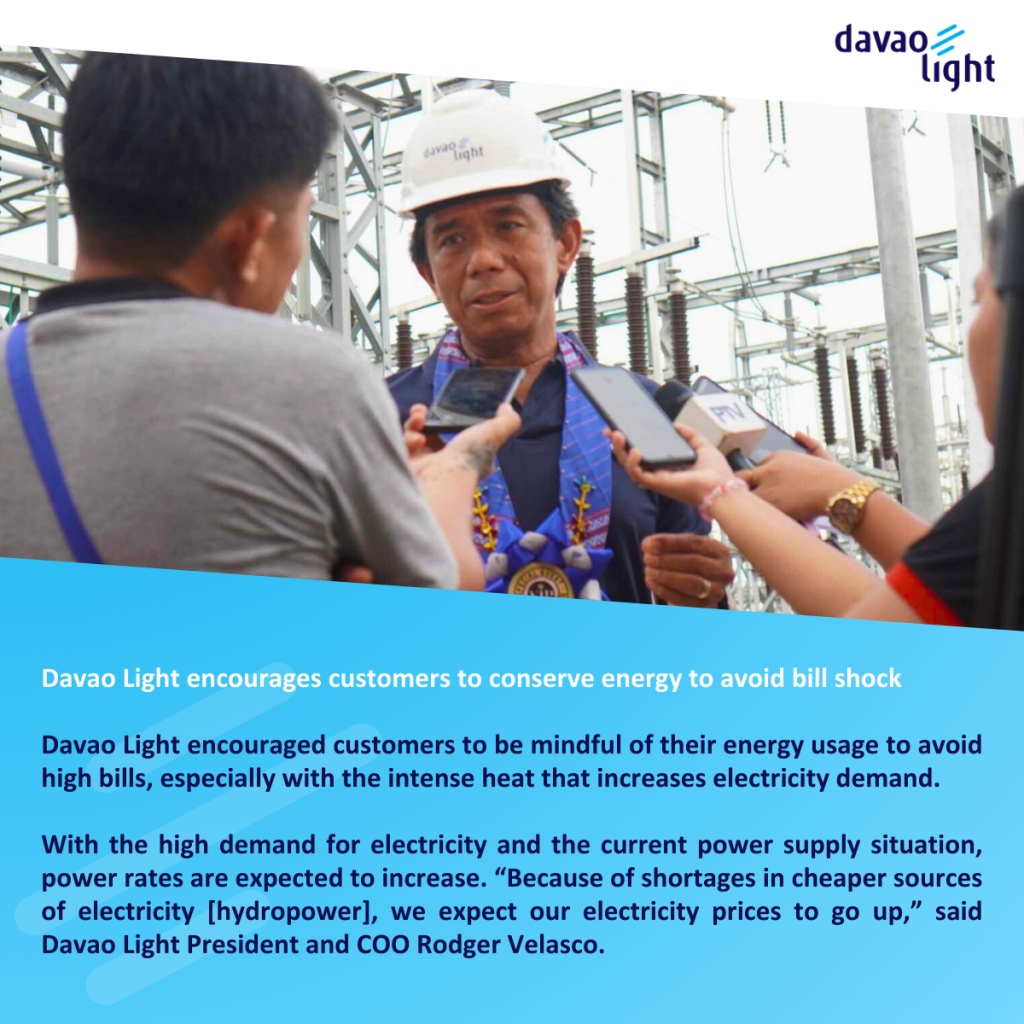
WITH temperatures up due to the ongoing warm and dry season coupled with the effects of the El Niño phenomenon, Davao Light and Power Co., Inc. (Davao Light) once again reminded customers to conserve energy to avoid bill shock.
Even more so now that Mindanao was placed on yellow alert by the National Grid Corporation of the Philippines (NGCP) last April 24, the island’s first time this year following the red alert raised in Luzon and the Visayas which resulted in rotational outages.
According to NGCP’s advisory, a yellow alert is raised when the power supply’s operating margin fails to meet the contingency requirement of the transmission grid. This was issued in Mindanao after nine (9) power plants were forced to shut down while five (5) were on reduced capacity as hydropower plants were affected by the El Niño phenomenon.
The Department of Energy (DOE), on its part, assuaged fears of rotational outages in Mindanao. DOE Assistant Secretary Mario Marasigan, CESO III shared during a radio interview last April 25 that the island will not experience any rotational outages soon. “Hindi pa po tayo magkakaroon ng rotational brownout. Ang ibig lang pong sabihin nyan [yellow alert] ay meron pong kakulangan ang ating reserba nang suplay kung sakali pong meron isang malaking planta na magkakaroon po ng deperensya at hindi po makakapagsuplay ng kuryente… Huwag po tayong mangamba. Hindi po kulang ang suplay ng kuryente natin sa Mindanao,” Marasigan said.
Even with the assurance that the Mindanao power supply is sufficient, Davao Light encouraged customers to be mindful of their energy usage to avoid high bills, especially with the intense heat that increases electricity demand.
Davao Light President and COO Rodger Velasco shared that the power distribution utility recorded its highest power demand in many years. “In April, we recorded a 536-megawatt (MW) demand in our franchise area from 432MW in February and 479MW in March.” Davao Light’s franchise area covers the cities of Davao, Panabo, and the municipalities of Carmen, Dujali, and Sto. Tomas.
With the high demand for electricity and the current power supply situation, power rates are expected to increase. “Because of shortages in cheaper sources of electricity [hydropower], we expect our electricity prices to go up,” said Velasco.
This is especially true in the billing period of April 11-May 10 when residential customers saw a slight increase of P0.1379 per kilowatt-hour (kWh) in their bills as the overall residential rate rose from P8.9975/kWh last March to P9.1354/kWh in April. This is equivalent to an increase of around P27.58 for a typical household with an average monthly electricity consumption of 200 kWh.
The uptick is attributed to higher power supply prices from the Philippine Wholesale Electricity Spot Market (WESM) in Mindanao which pushed the generation rate up.
Davao Light advises households to save electricity by utilizing natural light during the day and improving ventilation by opening windows and curtains to allow air to flow freely. In turn, this will keep the house cool during warm days. Households can also manage their consumption by assessing their energy needs by identifying which appliances are often used and have high wattage ratings, and then lessening the hours or days used for these appliances.
For more energy conservation tips, Davao Light customers may check the power distribution utility’s official Facebook page DavaoLightOfficial. Meanwhile, for the complete monthly rates, customers may check www.davaolight.com.
Davao Light, an Aboitiz Power Corporation subsidiary, aims to provide its customers with a front-seat vantage point regarding its services, including the sourcing and pricing of its electricity. This is in line with the mission of the company to deliver, at the most reasonable cost, safe and reliable electric service to the people and businesses it serves.




